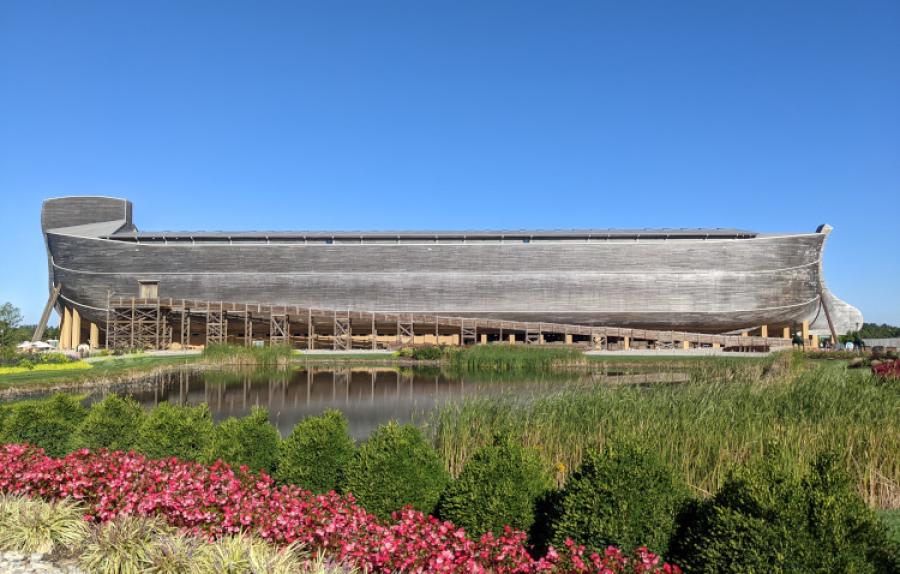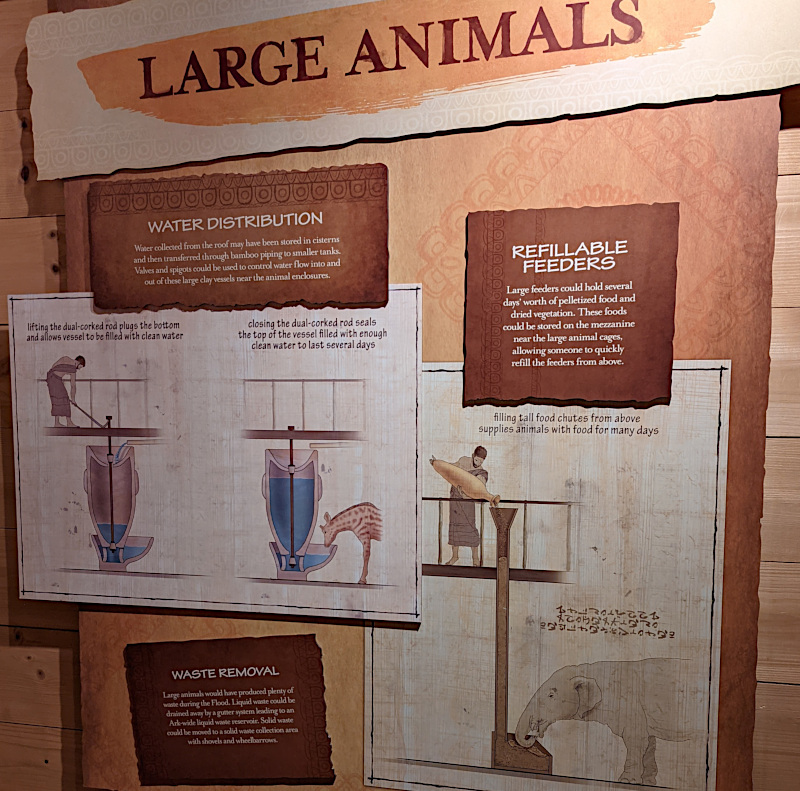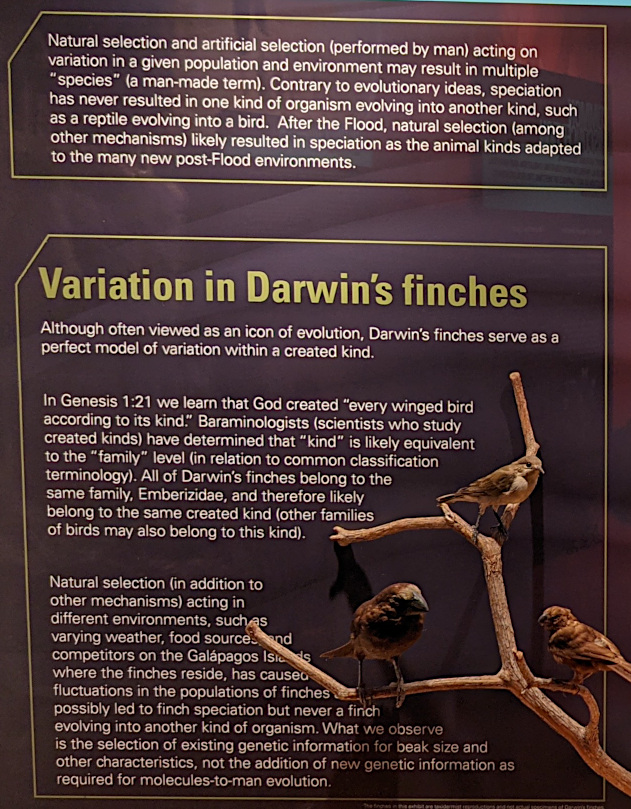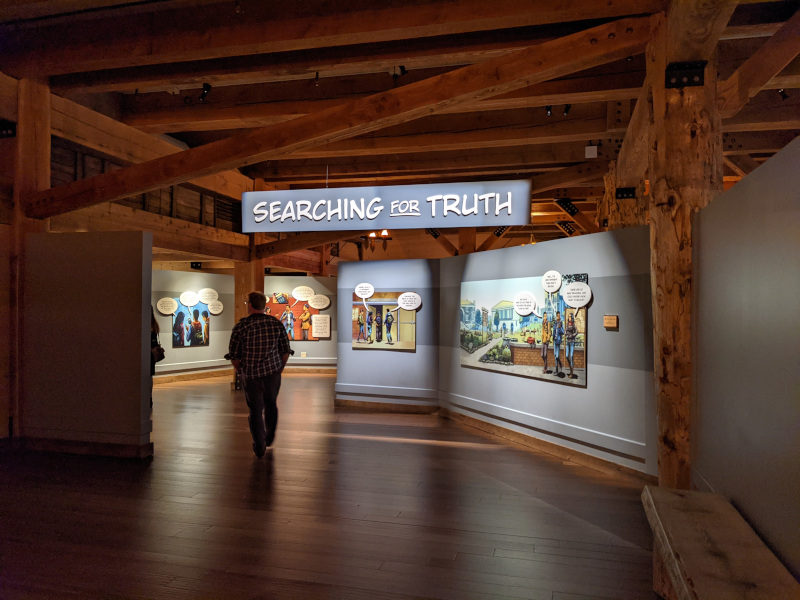Thoughts from My Visit to AiG’s Ark Encounter & Creation Museum
Image

Those who have visited Answers in Genesis’ Ark Encounter or Creation Museum will have their own perspective on the experience and its value. I’ve just returned from my own first-time visit to both and have some observations and thoughts for those who haven’t yet made the pilgrimage.
Is it just a big entertainment business making a few people rich?
Revenue is an inherently tempting thing. Just getting a paycheck every couple of weeks brings hazards as well as blessings. One of the hazards is that as revenue increases, my life and work might become increasingly about revenue.
We’d be fools to think that Ken Ham and Answers in Genesis are invulnerable to that temptation. There are also signs that could be viewed as evidence that AiG is on that road.
- It’s Number 1: The Ark Encounter and Creation Museum have made Northern Kentucky the biggest faith-based tourist destination in America.
- Answers In Genesis to Launch Answers.tv Streaming Platform
- The Latest Biblical Attraction: The Tower of Babel: Answers in Genesis plans a three-year expansion at its Ark Encounter site in Kentucky.
The growth above is in addition to AiG’s already-expansive ventures into Sunday School, VBS, and homeschool curriculum.
Because of how evangelical ministry tends to drift, I had concerns about this before I went to Ark Encounter (Ark) and the Creation Museum (CM). Being there didn’t erase those concerns. I hope and pray that AiG won’t be sucked into the “more and more, and bigger and bigger, is better” trap that afflicts so many megachurches and other large ministries.
That said, I don’t believe that right now, AiG is just an evangelical entertainment biz, pandering to the lowest common denominator of evangelical thrill seekers and belief-validation seekers.
Some reasons why:
- If you’re going to do infotainment at all, you should do it right.
- Doing it right is expensive.
- AiG is shooting for top notch quality, and usually achieving it.
Pretty much everything at Ark is top-notch and nearly everything at CM is also (Exception: The planetarium show on aliens is much in need of an update. The show on the scale of the universe more than makes up for it, though!).
Both sites—which are a good 40 minutes apart by freeway—are kept in excellent condition and surrounded by extremely beautiful gardens. Both are full of exhibits that are as good as any I’ve seen anywhere. I’m not a museum buff, but Ark & CM rival the best museums I’ve toured in visual appeal, clarity, variety and thoughtfulness of the exhibits.
I imagine it would be hard for passionate non-believers to get past that and appreciate the quality of the exhibits, but it’s probably not hard for Christians with different views on the events of Genesis to appreciate.
Are these sites effective apologetics or just preaching to the choir?
Multiple aspects of both Ark and CM surprised me—a few examples:
- Though it has “theme park” like stuff on site (zip line, camel rides for kids, a VR show of some sort, etc.), the Ark itself is pretty much a museum housed inside an exhibit … a cool idea by any standard.
- The love of Christ and the gospel pops up all over in all sorts of ways, both subtle and intentionally non-subtle. In places, the gospel is portrayed with extraordinary beauty and grace. I teared up a bit more than once.
- The level of detail! Multiple times during our day there, my critical thinking circuits would go, “Hmmm, but what about this…?” only to later find that very question directly addressed. The evidence and reasoning in the answers is selective—it has to be—but AiG seems to have thought of all the questions.
- With a few givens in place (e.g., “kinds,” no hibernation, cubit size), I found the project persuasive as a demonstration of one way Noah’s ark could have done the job literally as described in Genesis.
- Tone: The tone is mostly educational, not polemical. I also saw less inappropriate dogmatism than I expected.
But are these sites effective apologetics? Several points on that.
- Ark is definitely more infotainment-oriented than CM.
- Both are clearly aimed at general audiences, not intellectual elites, though CM is a bit more toward that end of the scale.
- Both are clearly aimed at declaring the whole gospel story and educating Christians about Genesis—not mainly equipping believers for debates with skeptics or winning over critics on intellectual grounds.
- Ark is not presented as a “you can believe Genesis now that you’ve seen it” thing. It’s more of a “you can understand Genesis better now that you’ve seen it” thing.
If you go to learn, you won’t be disappointed. If you go hoping to use something there to win your agnostic or atheist friend to Christ—there’s good stuff for that also, but probably not in the “conversion by winning the debate” vein.
Could it be better in some ways?
You can always find ways to make something better.
Infotainment. The blending of “theme-parkiness” with “museuminess” involves some trade-offs. If you dial down the entertainment aspect, you reach fewer people, including some who would be drawn into more thoughtful engagement with the ideas. But the entertainment aspect feeds the skepticism of those who are approaching the big questions more intellectually and suspect the projects are just fun and games and money. I’d like to see CM become even less theme-parky, though it’s already noticeably less so than Ark.
Counterarguments. At multiple points in both Ark and CM, but especially CM, I was aware that there are alternate views and counterarguments against what AiG was presenting. I couldn’t recall what they were and thought the exhibits might be enhanced by acknowledging these more and maybe pointing inquirers to where they can dig deeper into those debates. For example, CM is emphatic that earth must be 6,000 years old because the genealogy in Genesis notes the ages of individuals when they died—so there can’t be gaps. The exhibit leaves it at that.
You can only say so much in exhibit format—and many of CM’s exhibits are already a lot of reading. So I sympathize. Still, maybe there’s a way to use tech to allow guests to tap a Dig Deeper icon and find out why, for example, some still see maybe tens of thousands of years in Genesis but still consider themselves young earth creationists.
Assumptions. Ark is extremely well imagined, and I use “imagined” intentionally. It’s full of detailed explanations of how waste disposal, food distribution, ventilation, water, and more may have been engineered to allow eight people to care for around 800 animals each. Some brilliant engineers had to work through all of that—which means Noah, his family, and whatever other resources he could access, would also have to have done a lot of brilliant engineering.
I don’t find that difficult to believe. There was plenty of time to design and test systems, find failure points, and design new ones, etc. Also, though “Noah built the ark,” we don’t have to believe he never hired anybody for design, materials, and labor.
But a huge portion of the project is built on the assumption that God didn’t simply put all the animals into hibernation. I’m aware of the counterargument that Genesis doesn’t mention hibernation, so we’re filling in gaps from our own thinking on that. But if you visit the Ark you can hardly help but realize Genesis also doesn’t mention intricate waste disposal, food distribution and water management systems! Any view that takes the flood and ark account as historical/factual has two choices:
- Leave the details to God: “It’s not important to me how God made it all work.”
- Imagine a great deal to theorize how it all could have been done.
A portion of a small animals exhibit from Ark…

A portion of a large animals exhibit at Ark …
 Is it less biblical and theologically sound, or more presumptuous, to imagine hibernating animals, a smaller cubit, and a smaller ark that isn’t so thoroughly engineered? (AiG’s attitude is that maybe hibernation happened but it wasn’t necessary.)
Is it less biblical and theologically sound, or more presumptuous, to imagine hibernating animals, a smaller cubit, and a smaller ark that isn’t so thoroughly engineered? (AiG’s attitude is that maybe hibernation happened but it wasn’t necessary.)
One other fact that hit me during these visits is that the AiG concept of “kinds” (Gen. 6:20, 7:14) means they do believe in the evolution of species. They would strongly prefer not to say it that way, because they define “evolution” as the complete naturalistic, molecules-to-man package. But in AiG’s view, a “kind” is a broader category than a species, and we have far more species today than Noah had “kinds” in his day. That would mean that after the flood, specimens of each kind evolved into the many species we have today—by natural selection (see photo of CM exhibit).

Given the relationship of kinds to species and the role of natural selection, maybe we need to stop being so broadly negative about “biological evolution,” and learn more nuanced ways of communicating the differences and similarities between creationist and naturalist views of life on earth.
Should you go?
You don’t have to be convinced that AiG has all the details right to benefit from the Ark Encounter and the Creation Museum. At the very least, these projects are thought-provoking, interesting, and well integrated with the theology of God’s grand plan of creation, fall, redemption, and restoration (CM uses the “Seven C’s” of Creation, Corruption, Catastrophe, Confusion, Christ, Cross, Consummation).
Believers don’t need to see a full scale ark model to be firm in their faith in God and His Word. Ark and CM are not about that. They’re about learning and deepening understanding as well as viewing the world in a more God- and gospel-centered way.
I think you should go. Should you bring your agnostic or atheist friend? That depends on a lot of factors, but it could certainly be a route to some thoughtful conversations about the big questions of what life is, why we’re here, what’s gone wrong, and what it all means.
A small animal storage area from Ark …
The graphic novel style gospel exhibit at Ark …

(Photo credits: Me and my Pixel 5.)
Aaron Blumer 2016 Bio
Aaron Blumer is a Michigan native and graduate of Bob Jones University and Central Baptist Theological Seminary (Plymouth, MN). He and his family live in small-town western Wisconsin, not far from where he pastored for thirteen years. In his full time job, he is content manager for a law-enforcement digital library service. (Views expressed are the author's own and not his employer's, church's, etc.)
- 206 views
Because (among other things) the verse I cited above states that in at least one case, there was an accelerated process that led to the end result. I don’t think any YEC quibbles with the concept that some things follow that pattern; what we quibble with is “the concept that everything follows that pattern.”
(Unless perhaps I’m misunderstanding what you’re saying?)
@Mark, it’s not a hijack to dive into age of the earth in a thread following an article about the creation museum. I mean, it’s pretty hard to discuss AiG at all without going there to some extent.
Personally, I respect any effort to be intellectually honest about both the authority of scripture and what we observe in the world God made. And I think the intellectual honesty piece is recognizing that this is not an easy problem.
This is not the same as the typical “appearance of age” argument—the processes actually took place, just at a much faster rate, as if time itself were sped up. I don’t know if AiG has a favored theory or not, but Danny Faulkner (at AiG) has proposed something at least conceptually similar to this “quick-time” scheme.
I’ve often said, and heard it said, that God created a mature universe. This is also a bit different from saying with the appearance of age, though for some, it would be too close to be comfortable. But I think language like mature universe pretty easily accommodates the idea of billions of years of processes occurring in less than billions and billions of years chronologically, as we measure time now.
I’m no physicist (lol) and certainly don’t grasp quantum physics either, but I did read a book recently—a couple of books actually—that delved into quantum physics to one degree or another. They were both written by creationists who are not young earthers, and weren’t on the topic of the age of the earth at all. What I was able to grasp from these guys, more or less, is the degree to which time and material and mind become much more difficult concepts when they get into the quantum stuff. So… It doesn’t seem unreasonable to me as a layman to suppose that time could have worked very differently for a while when nothing became something.
One of the books was Three Views on Christianity and Science. The chapter by Bruce Gordon blew my mind… just a little (I’m still looking for some of the pieces!)
The other read was Alvin Plantinga’s book on Where the Conflict Really Lies. I’m a bit off topic now, because both of them pretty much assume an old universe, but the connection is just that the way they delved into quantum physics put the whole phenomenon of time in a different light.
Views expressed are always my own and not my employer's, my church's, my family's, my neighbors', or my pets'. The house plants have authorized me to speak for them, however, and they always agree with me.
[G. N. Barkman]Since the very concept of “creation” requires what we would call “miracles”, why is it unacceptable to believe God created all these processes in full operation, as if they had been operating for many years? Adam was not created as a newborn. He was created a fully functioning grown man from the first minute of his existence. If a scientist had examined Adam the day after his creation, using the information we have today, he would have pronounced Adam to be, say thirty years old. He would probably have insisted that it is preposterous to believe that Adam was only one day old. That claim defies everything we know scientifically about the human body. But Adam was actually only one day old. God did something unique with the creation of Adam that is completely different than what is true of every man who came after Adam. I think the Adam analysis is obvious. Why, then, do we quibble with the concept that everything else about creation follows a similar pattern?
Appearance of Age arguments are the favorite of the average armchair YEC person, but even AiG rejects it. Did you know that?
What I am saying is NOT that miracles did not happen in the creation. Of course they did. The point is IF the universe is young (about 6000 years old) then something is off between our observations and what the biblical testimony is. Our observations with little doubt show a universe that is old and huge. We see old stars, young stars, dead stars, newly forming stars, all of it. We see farther back in time as we look farther out, suggesting light traveled as normal over billions of years. This suggests a universe about 13.7 billion years old. Our own planet looks to be 4.5 billion with a star a little older than that as you would expect.
So why the difference between scientific observation, which is backed by hundreds of local experiments to verify what we are doing, and a the YEC interpretation of 6000 years? That is the question.
Appearance of age is one choice. It is ok but the COST of appearance of age is that you lose the ability do what we call “science” when you say “God made the universe mature looking.” That’s is not an attack, its a fact. Adam, assuming he looked 30-ish, was NOT 30 years old. His body did not form the way every human since him and Eve did. He is an aberration. A MIRACLE. The universe would be like Adam’s body. It looked 30 but it was not… For the universe that would mean it looks like it is old and big but it is not… you cannot do science which assume regular processes on a miracled universe.
Apparently AiG, not liking appearance of age, is now talking about “sped up time”. That is Danny Faulkner. When Jason Lisle was there he talked about relativistic effects, but Faulkner did not like that (nor did Ken Ham I think because Lisle left). Sped up time (but not in the way relativity talks about it) is just a form of appearance of age. You cannot do science if the observations of science are not being followed. Light travels at 300,000 km/s. It has been measured over an over again. It has been measured to look for changes in the speed light. None have been found.
So, if the universe is young SO BE IT. I am fine with that. But the cost of a young universe is no science called astronomy. You can’t do it. The necessary preconditiones were not met in the universe to do what we call science.
Here is why appearance of age is bad. Let’s say the day Adam was made he had cavities in his teeth and a scar on his skin that looked like it was from an old wound. Things like that would be expected of a real 30 year old man who had lived 30 years time, but Adam did not. If he had things that marked events that never happened, that would be deceptive, implying events that never occurred.
This is the problem with an “appearance of age” to the universe. There are dead stars all over the place. Lots of them. White dwarfs. Neutron stars. Black holes. Black dwarfs. This tells us stars have been around for a long time. Way longer than 6000 years. But if the universe is young, how did they have time to live and die? This is like Adam’s scar dilemma.
So, AiG rejects appearance of age for this reason. Faulkner is proposing “sped up time.”
I cannot recreate “sped up time” in my lab. Time flows at its present rate today. Light travels at its rate today. We can measure the speed of light today AND in the past as well. The speed of light has not changed. So, IF the solution to the apparent discrepancy between 13.7 billion years of age by observation and 6,000 by genealogy in the Bible is “sped up time”, there is no legitimate science called astronomy. Science is using scientific experimental results found here on Earth and applying them out there. Whatever “sped up time” is it is not science.
Let’s say the day Adam was made he had cavities in his teeth and a scar on his skin that looked like it was from an old wound. Things like that would be expected of a real 30 year old man who had lived 30 years time, but Adam did not. If he had things that marked events that never happened, that would be deceptive, implying events that never occurred.
I’m not a fan of “appearance of age,” but I’m not sure this argument works. The reason is that things we would expect of a person who has aged is not the same thing as essential attributes of aging. In theory, you could reach adulthood without any of those particular events happening to you. So, you have attributes that are very common among people who have aged, but that’s not quite the same thing as saying they define age. From a philosophical standpoint I’m not really sure what the essential attributes of aging would be… But probably they’d all have to do with changes in body chemistry.
I understand what you’re saying about astronomy though. Because if you observe that this collided with that and this or that exploded etc., it doesn’t really matter if those are essential attributes of aging or not. They are observable phenomena, so they need an explanation.
Views expressed are always my own and not my employer's, my church's, my family's, my neighbors', or my pets'. The house plants have authorized me to speak for them, however, and they always agree with me.
In the appearance of age model, I am saying seeing dead stars is like seeing scars on Adam. They represent things that must have happened but could not have. That is deceptive. You got the basic idea.
You could also say it would be like there being dead bodies buried along with Adam’s creation. It implies people lived who never did.
Doesn’t science depend upon assumptions of uniformity? But if presently observed processes are different from past processes, science is incapable of accurately analyzing the past. It is assumed that dead stars lived for billions of years before they died. That corresponds to presently observed processes and assumes past processes occurred in the same manner at the same rate. But if this is not the case, science has no way of extrapolating present observations into explanations of the past. When science describes what it presently observes, it is on solid ground. When it assumes what happened in the past, but without the ability to verify that past events happened in the same manner as presently observable processes, science ventures beyond its true capability. (Or so it would appear to this admittedly non-scientist.)
G. N. Barkman
[G. N. Barkman]Doesn’t science depend upon assumptions of uniformity? But if presently observed processes are different from past processes, science is incapable of accurately analyzing the past. It is assumed that dead stars lived for billions of years before they died. That corresponds to presently observed processes and assumes past processes occurred in the same manner at the same rate. But if this is not the case, science has no way of extrapolating present observations into explanations of the past. When science describes what it presently observes, it is on solid ground. When it assumes what happened in the past, but without the ability to verify that past events happened in the same manner as presently observable processes, science ventures beyond its true capability. (Or so it would appear to this admittedly non-scientist.)
The way you wrote this is the angle AiG puts on things. Yes, science relies upon processes we observe and measure here on Earth. It then projects them to “out there.” That is called the Cosmological Principle and is based upon the idea that Earth is not “special” in the universe. Everything we see here acts the same way “out there.” This is the only way we can do science. If it turned out chemistry acted different in the Andromeda Galaxy, what could we do to understand it? So in that sense it is an assumption. But we can measure a LOT of what stars and galaxies do by looking at the light they emit, which then travels to us. It turns out that physical processes out here act just like they do here. Amazing. In other words stars we see 10,000 ly away act like those closer to home. So our assumption looks valid.
My point is, if it turned out that we cannot do science now applied to the past, THEN WE CANNOT DO SCIENCE and there is no astronomy, which is what I argued in the above posts. So the result of a 6000 year old earth is no astronomy. Then forget about measuring distances because measuring distances relies upon assumptions that you cannot verify or rely upon.
The problem is astronomy works! You can measure thousands of things and they all are reasonable and match up to what you predict from theory developed from what we see here at home. So science is NOT BOGUS….
Let me say it another way. The speed limit of the speed of light means constant new data is coming in fresh. The fact that light emitted a million years ago is just arriving today means, for all practical purposes, we are doing science in the PRESENT in astronomy. So the assumption you made about sciences like astronomy is wrong.
Science took hold in the Roman empire and then following because God was not like the earlier pagan gods. He is regular and reliable. He creates laws and sets the universe to following them. This is unlike the capricious gods of the Egyptians, Greeks, or the Babylonians. With pagan gods there was no predictable behavior expected to the universe. But the God of Abraham, Isaac, and Jacob was not like that. Our way of thinking changed and we began to study nature expecting it to behave predictably and reliably.
Now it seems that conservative Christians are tempted to go back to the capricious ways… God “did something” to make the universe appear old but not be old, or to be old but time to act weird. Nope. I’m sorry, that is not right. Maybe your interpretation is off kilter….
[Mark_Smith]I cannot recreate “sped up time” in my lab. Time flows at its present rate today. Light travels at its rate today. We can measure the speed of light today AND in the past as well. The speed of light has not changed. So, IF the solution to the apparent discrepancy between 13.7 billion years of age by observation and 6,000 by genealogy in the Bible is “sped up time”, there is no legitimate science called astronomy. Science is using scientific experimental results found here on Earth and applying them out there. Whatever “sped up time” is it is not science.
I hear what you’re saying, but it’s not as stark as that. You can in fact still do some science if He sped up time in self-consistent manner—you’d get the same results, sequence of events, etc.; only the deduced timeframe would be wrong. It’s the self-consistency which would save astronomy. (In fact, it’s God’s self-consistency that makes science possible in the first place.)
Put it another way: astronomy can test whether cosmic history has proceeded in a way consistent with the currently observable laws, whether or not there was a quick-time period in the past. E.g., do galaxies build up metals over cosmic time in a way consistent with stellar nucleosynthesis.
Much more I could say, but I’m supposed to be at work five minutes ago :-)
I guess my thinking must be too simplistic, but I don’t see how anyone can avoid the “appearance of age” concept. The day after Adam was created, he was in actual fact, one day old, but he appeared to be at least two or three decades old. The same can be said for nearly every other component of creation. Trees appeared to be decades old that were, in fact, one day old, etc. How old did the moon appear the day after it was created? How old did a mountain appear the day after it was created?
I know I’m not a scientist, but I’m having difficulty following the argument that if the universe is 6,000 years old, we are unable to “do science.” It seems to me that this statement is based upon assumptions that may or may not be valid.
G. N. Barkman
I tend not to get caught up in the exact age of the universe. I feel that Scripture is very clear in the fact that creation took place out of nothing and took place in (6) 24 hour physical days. Scripture is not dogmatic on the age of the universe, but I lean toward a much younger universe than one which was billions of years old. Does it contradict what we see in nature? Yes, but it was a miraculous event. No different from Christ rising from the dead on the 3rd day, contradicts all biological laws.
I would say that the biological laws surrounding death are more certain and sound, than cosmological laws, although I am not trying to introduce anything that discredits cosmological laws. As humans we can only study the universe within the limitations of what we can see and observe, and we can only describe within the limitations of our understanding. I can be a bit more dogmatic that when death takes place and has proceeded for three days, and that this death was also confirmed by God, that life will not spontaneously come back after three days of death. This is a fairly understood and studied process and has been witnessed millions of times. I am less dogmatic on what happens inside of a blackhole.
[Mark_Smith]Using this logic, wouldn’t most miracles be inherently deceptive? When Jesus turned water into wine, and it seemed to the drinkers just like wine made with natural processes, was Jesus being deceptive?In the appearance of age model, I am saying seeing dead stars is like seeing scars on Adam. They represent things that must have happened but could not have. That is deceptive. You got the basic idea.
They represent things that must have happened but could not have. That is deceptive.
Why is that deceptive if God told us what he did? It’s only deceptive if he told us he did something he did not do.
And why “must” it have happened? Was it deceptive when Jesus turned water into wine, something that clearly implied a much longer time? Must there have been a fermentation process? Why is that different?
I am not sure your points here are logical or theological. God told us he created a mature universe so when we look at it, we should expect it to be mature. There is nothing in the universe that is unexpected in light of Gen 1. It is only unexpected if you skip Gen 1, it seems to me.






Discussion